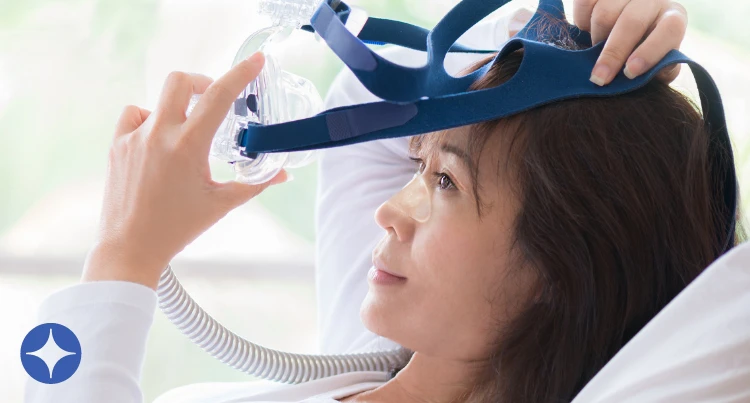
Using a CPAP device is one of the most effective treatments for sleep apnea. However, a variety of issues may occur that make it uncomfortable. Fortunately, these problems are normal and easily solvable with a few simple steps.
1. Dry Mouth: Causes and Solutions
The pressurized airflow from the CPAP machine can dry out your mouth1 while you sleep. Most CPAP devices include an integrated heated humidifier to increase moisture and prevent dry mouth. If you experience dry mouth often, you may need to adjust the humidity levels or add a room humidifier.
Mouth breathing2 is another common culprit. Breathing through your mouth while wearing a CPAP mask can affect the fit of the mask and allow air to leak out. If this is the case for you, try adding a chin strap to keep your mouth closed, adjust the fit of your mask or switch to a full-face mask. You should also discuss other possible factors like medications, health conditions and salivary gland problems with your doctor.
2. Mask Leaks: Identifying and Fixing the Problem
A CPAP device must create a seal with your face to work properly. If an ill-fitting mask allows the pressurized air to escape, it decreases the effectiveness. An improper fit, incorrect mask size and sleeping on your stomach or side can all cause mask leaks1.
To fix leaks3 and prevent further occurrences, regularly adjust your mask to ensure correct size and fit. Replace the straps and cushions when they wear out to make sure the mask seals with your face. Consider trying a different style of mask, like a nasal pillow or full-face mask. Using a CPAP pillow is another great way to improve comfort and prevent mask leaks.
3. Skin Irritation and Discomfort
For some users, wearing the device causes CPAP dermatitis4. This is a type of skin inflammation from contact with an irritant or allergen and may result in red, itchy, swollen or blistered skin. There are several reasons why a CPAP mask can trigger dermatitis, including:
- friction against your skin.
- poor fit.
- bacteria, dirt or oil on the mask.
- sensitive skin.
- accumulated moisture.
- a too-tight mask that puts pressure on your face.
Prevent skin irritation by opting for hypoallergenic materials. Clean your mask regularly to remove dirt and bacteria. Barrier creams, mask liners and products like Liquicell can also make the mask more comfortable and less irritating.
4. General Tips for CPAP Success
Plenty of solutions exist for CPAP issues5 and it's important not to give up on treatment. With consistent use and gradual adaptation, wearing your CPAP will get easier. Other helpful tips to ensure successful CPAP therapy include thorough cleaning6 and regular maintenance of the CPAP machine and accessories. Always consult your healthcare provider7 for persistent issues and with any questions you have about your device, usage or your health.
Conclusion
The long-term benefits of a CPAP8 are well worth the effort of overcoming any challenges. Not only will it treat sleep apnea and improve your sleep quality, but CPAP can improve your cognitive function, reduce your stroke risk and lower your risk of developing high blood pressure.
Stay proactive and patient on your journey to better health and wellness. Consider sharing your experiences in the comments to help others. You can also ask questions to get advice and support.
References
- Sleep Apnea – Troubleshooting CPAP Problems
- Sleep Foundation – CPAP Dry Mouth: How to Stop It
- Sleep Apnea – Why Does My CPAP Mask Leak? 8 Common Reasons and How to Fix Them
- Sleep Apnea – CPAP Dermitis: Cause and Prevention
- Harvard Health Publishing – I can't tolerate CPAP, what can I do?
- U.S. Food & Drug Administration – Do You Need a Device That Claims to Clean a CPAP Machine?
- Cleveland Clinic – CPAP Machine
- National Heart, Lung, and Blood Institute – CPAP




